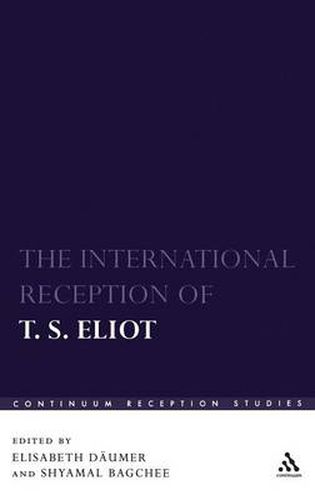Readings Newsletter
Become a Readings Member to make your shopping experience even easier.
Sign in or sign up for free!
You’re not far away from qualifying for FREE standard shipping within Australia
You’ve qualified for FREE standard shipping within Australia
The cart is loading…






The International Reception of T. S. Eliot brings together a wide range of international perspectives on this influential twentieth-century author, who as poet, critic, and editor did much to shape modernist poetics, not only in Europe and North America, but also world-wide. Foregrounding distinct aspects of Eliot’s international reception, individual chapters of the book illuminate such topics as Eliot’s complex impact on the development of modernist poetics in the post-colonial Caribbean, the emergent state of Israel, and colonial India; the insurgent potential of translated Eliot in Soviet-occupied Romania and post-war Germany; the different ways in which Eliot’s work has entered the cultural life of national and emergent national contexts like Iceland, Italy, Spain, China, and Japan; the relationships forged with Eliot’s poetry and criticism by such authors as Jorge Borges, Czeslaw Milosz, A.J.M. Smith, and E.R. Curtius; the unique reverberations of Eliot’s work in the bi-cultural lives of contemporary scholars; and the challenges of teaching Eliot across boundaries of culture and religion. Importantly broadening the purview of Anglo-American Eliot Studies, the book should prove essential reading for scholars around the world interested in Eliot and modernism, as well as post-colonial theory and modernist translation theory.
$9.00 standard shipping within Australia
FREE standard shipping within Australia for orders over $100.00
Express & International shipping calculated at checkout
The International Reception of T. S. Eliot brings together a wide range of international perspectives on this influential twentieth-century author, who as poet, critic, and editor did much to shape modernist poetics, not only in Europe and North America, but also world-wide. Foregrounding distinct aspects of Eliot’s international reception, individual chapters of the book illuminate such topics as Eliot’s complex impact on the development of modernist poetics in the post-colonial Caribbean, the emergent state of Israel, and colonial India; the insurgent potential of translated Eliot in Soviet-occupied Romania and post-war Germany; the different ways in which Eliot’s work has entered the cultural life of national and emergent national contexts like Iceland, Italy, Spain, China, and Japan; the relationships forged with Eliot’s poetry and criticism by such authors as Jorge Borges, Czeslaw Milosz, A.J.M. Smith, and E.R. Curtius; the unique reverberations of Eliot’s work in the bi-cultural lives of contemporary scholars; and the challenges of teaching Eliot across boundaries of culture and religion. Importantly broadening the purview of Anglo-American Eliot Studies, the book should prove essential reading for scholars around the world interested in Eliot and modernism, as well as post-colonial theory and modernist translation theory.